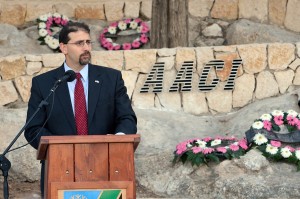A former advisor of President Barack Obama’s ambassador to Israel defended Obama’s legacy in Israel on Tuesday.
Scott Lasensky, a UCLA alumnus, served as a senior advisor to Ambassador Daniel Shapiro, where he worked to improve public engagement and policy advising in Israel. He spoke to about 35 students, faculty and community members in Bunche Hall.
The United States has been Israel’s strongest ally politically and militarily. However, relations between Obama and Israeli Prime Minister Benjamin Netanyahu became strained over Israel’s occupation of the West Bank and Gaza, construction of settlements and the Iran nuclear deal, among other issues.
Lasensky began his discussion by highlighting a central dilemma for policy makers about Israel: whether the U.S. should defend Israel or promote peace. He added many see the two objectives as contradictory to each other.
Lasensky added he thinks most presidents have handled that dilemma similarly, trying to negotiate without making any stark decisions, which has created historical continuity in U.S. relations with Israel.
He also said he thinks Obama’s performance was about the same as past presidents.
“I think for the most part, though I know a lot of people disagree with me, Obama did a great job in Israel,” Lasensky said. “If you look closer at what he did, he deserves a lot of credit.”
Lasensky said he thinks Obama’s best diplomatic move was appointing John Kerry to oversee Israeli-Palestinian relations. Kerry negotiated with Israelis while involving Arabs and Egyptians, which led to one of the most quiet periods in Israel’s history, he said.
When comparing other presidents to Obama, Lasensky said he thinks President Bill Clinton’s presidency was a low point for U.S. relations with Israel because Clinton ignored Israel’s neighbors. He added he thinks President George W. Bush was not effective enough either because he focused too much on saying nice things without any action.
“Clinton was too involved and Bush was too laid back,” Lasensky said. “Obama gets high marks for being there to step in when needed but not constantly hovering over.”
Lasensky said he thinks people should judge Obama on a lower standard than other presidents because Israel is experiencing a difficult era.
“There’s a lot that goes on every day that the public knows nothing about,“ Lasensky said. “Obama continued to invest millions of dollars in a functioning security system on the ground. He wanted to make sure that the Israelis felt confident and safe.“

Lasensky added he thinks the Obama administration was too silent on what it was doing to improve U.S. relations with Israel.
When three Israeli teenagers were murdered in 2014 on a field trip in Israel, many Jewish groups criticized Obama for not denouncing the murder, Lasensky said. However, Obama personally reached out to the parents of the teenagers, which the public did not know about, he added. Lasensky said he thinks the administration should have been more transparent about Obama’s support for Israel.
Students who attended the talk said Lasensky helped them better understand the diplomatic situation between the U.S. and Israel.
“I liked how, although many people are opposed to Obama’s attempts in Israel, he gave a positive outlook on his administration,“ said Dina Abdel Mooti, a third-year political science student.
She added she thinks Lasensky did a good job of informing her about Israel.
Brandon Lee, a third-year political science student, also said Lasensky helped him understand the complicated situation.
“I don’t know a better way to get the inside scoop about the situation in Israel than from the senior advisor to the United States ambassador,” Lee said. “It’s a once in a lifetime opportunity to hear his perspective on the matter.“
